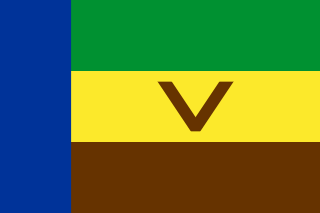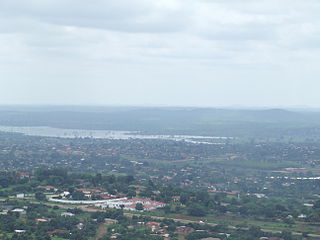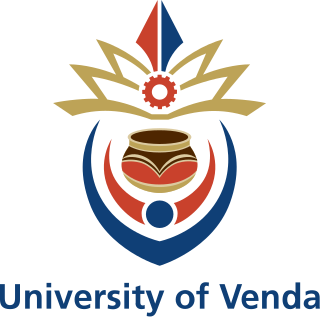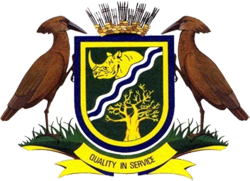Related Research Articles

South Africa is divided into nine provinces. On the eve of the 1994 general election, South Africa's former homelands, known as Bantustans, were reintegrated into the country, and the four provinces were increased to nine by dividing Cape Province and the Transvaal into three and four, respectively. The twelfth, thirteenth and sixteenth amendments to the Constitution of South Africa changed the borders of seven of the provinces.

Bophuthatswana, officially the Republic of Bophuthatswana, was a Bantustan that was declared (nominally) independent by the apartheid regime of South Africa in 1977. However, its independence, like the other Bantustans of was not recognized by any country other than South Africa.

A Bantustan was a territory that the National Party administration of South Africa set aside for black inhabitants of South Africa and South West Africa, as part of its policy of apartheid. By extension, outside South Africa the term refers to regions that lack any real legitimacy, consisting often of several unconnected enclaves, or which have emerged from national or international gerrymandering.

Venda or Tswetla was a Bantustan in northern South Africa, which is fairly close to the South African border with Zimbabwe to the north, while to the south and east, it shared a long border with another black homeland, Gazankulu. It is now part of the Limpopo province. Venda was founded as a homeland by the South African government for the Venda people, speakers of the Venda language. The United Nations and international community refused to recognise Venda as an independent state.

Venḓa or Tshivenḓa is a Bantu language and an official language of South Africa and Zimbabwe. It is mainly spoken by the Venda people or Vhavenḓa in the northern part of South Africa's Limpopo province, as well as by some Lemba people in South Africa. The Tshivenda language is related to Northern Sotho which is spoken in Southern Africa. During the apartheid era of South Africa, the bantustan of Venda was set up to cover the Venda speakers of South Africa.
His excellency King Patrick Ramaano Mphephu was the first President of the bantustan of Venda, which was granted nominal independence from South Africa on 13 September 1979.

Thohoyandou is a town in the Limpopo Province of South Africa. It is the administrative centre of Vhembe District Municipality and Thulamela Local Municipality. It is also known for being the former capital of the bantustan of Venda.
Sibasa is a village in Limpopo Province, South Africa and the former capital city of Venda bantustan. When Venda was declared independent in 1979, the capital was moved to Ṱhohoyanḓou.

The University of Venda is a South African comprehensive rural-based institution, located in Thohoyandou in Limpopo province. It was established in 1982 under the then Republic of Venda government.

The Vhembe District Municipality is one of the 5 districts of the Limpopo province of South Africa. It is the northernmost district of the country and shares its northern border with the Beitbridge District in Zimbabwe and on the east with the Gaza Province in Mozambique. Vhembe consists of all the territories that were part of the former Venda Bantustan; however, two large densely populated districts of the former Tsonga homeland of Gazankulu, in particular, Hlanganani and Malamulele, were also incorporated into the municipality, hence the ethnic diversity of the district. The seat is Thohoyandou, the capital of the former Venda Bantustan. According to 2011 census, the majority of the municipality's 800,000 inhabitants spoke TshiVenda as their mother language, while 400,000 spoke Xitsonga as their home language. However, the Tsonga people form the majority south of the Levubu River, while the Venda are the minority south of Levubu at 15%. The Sepedi speakers number 27,000. The district code is DC34.

The Venḓa are a Southern African Bantu people living mostly near the South African-Zimbabwean border. The Venda language arose from interactions with Sotho-Tswana and Kalanga initiates during the 15th century in Zimbabwe.
The system of racial segregation and oppression in South Africa known as apartheid was implemented and enforced by many acts and other laws. This legislation served to institutionalize racial discrimination and the dominance by white people over people of other races. While the bulk of this legislation was enacted after the election of the National Party government in 1948, it was preceded by discriminatory legislation enacted under earlier British and Afrikaner governments. Apartheid is distinguished from segregation in other countries by the systematic way in which it was formalized in law.
Parliamentary elections were held in Venda on 15 and 16 August 1973. The Venda Independence People's Party won 13 of the 18 elected seats in the Legislative Assembly.
Parliamentary elections were held in Venda on 5 and 6 July 1978. The Venda Independence People's Party won 31 of the 42 elected seats in the Legislative Assembly.

The Venda Defence Force (VDF) was established in September 1982 from the 112 Battalion of the South African Defence Force and the military branch of the Venda National Force which itself had been formed when the Venda homeland became independent from South Africa in September 1979.
Rank comparison charts of armies/land forces of apartheid states and territories in Southern Africa.

The 1987 Transkei coup d'état was a bloodless military coup in Transkei, an unrecognised state and a nominally independent South African homeland for the Xhosa people, which took place on 30 December 1987. The coup was led by the then 32-year-old Major General Bantu Holomisa, the Chief of the Transkei Defence Force, against the government of Prime Minister Stella Sigcau (TNIP). Holomisa suspended the civilian constitution and refused South Africa's repeated demands for a return to civilian rule on the grounds that a civilian government would be a puppet controlled by Pretoria.

The 1990 Venda coup d'état was a bloodless military coup in Venda, an unrecognised state and a nominally independent South African homeland for the Venda people, which took place on 5 April 1990. The coup was led by the then 48-year-old Colonel Gabriel Ramushwana, the Chief of Staff of the Venda Defence Force, against the government of President Frank Ravele (NPV).
Samuel Edwin Moeti was a South African politician and radio broadcaster who was a cultural leader of the Lemba people in Limpopo. He represented the African National Congress (ANC) in the National Assembly from 1994 to 1999, and in 2000 he was elected as the inaugural mayor of Vhembe District Municipality.
References
- 1 2 Elections in South Africa's Apartheid-Era Homelands "Bantustans" African Elections Database